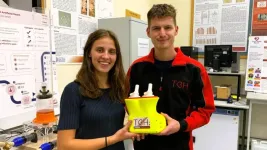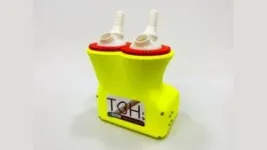(Press-News.org) Student engineers from the University of Bath are on top of the world after winning an international competition to design an artificial heart.
Team Bath Heart took top prize at the grand final of the first-ever Heart Hackathon, which was held in Texas at the end of October.
Six members of the team presented their device to global experts in artificial heart technologies, competing against teams from Australia, the United States, Sweden, New Zealand, Romania and Egypt.
The ‘total artificial heart’ they have developed could in theory be used to replace a heart patient’s organ. Artificial hearts are used in medicine to treat patients with certain cardiovascular diseases, usually while they wait for a donor heart to be found, or to help their heart recover.
Their winning design, currently a scaled-up prototype, incorporates cutting-edge materials and features a bag pumping mechanism to achieve sophisticated blood handling characteristics as well as automatic flow rate adjustment to respond just as a real heart does.
During the competition, which aims to encourage the medical and cardiovascular innovators of the future, team lead Fleur Upton and technical manager Alex Myers had to deliver a 15-minute presentation, before all six students were quizzed on their design choices by a panel of expert judges.
Each team was scored on the quality of their research, technical innovation and commercialisation efforts. The uniqueness of the Team Bath Heart design, which put patient needs at the centre of decision making, helped them stand out from their competitors.
Now comprising 45 students studying courses in engineering, computer science, biology and management, Team Bath Heart was established in early 2022 when six members of the team took on the challenge of creating an artificial heart as part of a group project.
Team lead Fleur Upton, who is studying Mechanical Engineering, said: “We are immensely proud to have won first prize at the Heart Hackathon. It was great to meet the other teams and learn about the different ways in which everyone approached the challenge, and how they innovated in different ways. Getting to work on the project has been incredibly rewarding, so to win the competition is really the icing on the cake.
“The whole team is grateful to the support of the University, and especially to our academic advisors Katharine Fraser, Mélusine Pigeon, to Chris Bowles from Harefield Hospital for their specialist advice, and to the judges."
Dr Katharine Fraser, one of Team Bath Heart’s academic advisors and a senior lecturer in Mechanical Engineering, said: “It was a tough competition with several excellent designs from the competitor teams. Team Bath Heart won because they analysed the needs of patients and clinicians, used everything they've learnt in their degrees so far, and put in a huge amount of time and effort, to create their completely new, innovative total artificial heart. We’re all very proud of the team and what they’ve achieved.
“Medical engineering and technologies like these have massive industrial potential, so as well as gaining great problem-solving and management experience in entering the competition, the team are also building really relevant skills for their future careers.”
Following the Heart Hackathon contest, members of the team attended the International Society for Mechanical Circulatory Support (ISMCS) conference, a meeting of the world’s top experts in artificial heart and blood technologies, to learn more about the field and to connect with industry professionals.
The team is now starting development of the next iteration of their design, with the aim of competing again at the 2024 Heart Hackathon final. Interested parties and prospective sponsors can contact the team at TeamBathHeart@bath.ac.uk.
ENDS
Contact: Will McManus, Media & PR Manager wem25@bath.ac.uk / +44 (0)1225 385 798
Images available at: https://tinyurl.com/sr7mrwda
Video available at: https://www.youtube.com/watch?v=1qCxwhyOgYc
The University of Bath
The University of Bath is one of the UK's leading universities for high-impact research with a reputation for excellence in education, student experience and graduate prospects.
We are named ‘University of the Year’ in The Times and The Sunday Times Good University Guide 2023, and ranked among the world’s top 10% of universities, placing 148th in the QS World University Rankings 2024. We are ranked 5th in the UK in the Complete University Guide 2024, 6th in the Guardian University Guide 2024 and 8th in the The Times and Sunday Times Good University Guide 2024.
Bath is rated in the world’s top 10 universities for sport in the QS World University Ranking by Subject 2023. We produce some of the world’s most job-ready graduates and were named University of the Year for Graduate Jobs by the Daily Mail University Guide 2024, as well as ranking as one of the world’s top 90 universities for employer reputation according to the QS World University Rankings 2024.
Research from Bath is helping to change the world for the better. Across the University’s three Faculties and School of Management, our research is making an impact in society, leading to low-carbon living, positive digital futures, and improved health and wellbeing. Find out all about our Research with Impact: https://www.bath.ac.uk/campaigns/research-with-impact/
END
Heart of Gold: Bath student team wins world Heart Hackathon competition
Team Bath Heart’s artificial heart wins top prize at international engineering & design contest
2023-11-10
ELSE PRESS RELEASES FROM THIS DATE:
Cleveland Clinic research links sleep apnea to increased risk of atrial fibrillation
2023-11-10
New research from Cleveland Clinic has identified a link between sleep apnea and the development of atrial fibrillation, a common heart rhythm disorder.
Published in JAHA, the study of over 42,000 patients found that sleep-related hypoxia - or low oxygen levels during sleep - is associated with a higher risk of developing atrial fibrillation over time. The study found this risk persisted even after accounting for lung function, suggesting sleep-related hypoxia independently increases atrial fibrillation risk separate from any underlying lung disease.
Atrial fibrillation causes an irregular ...
New approach to pancreatic cancer treatment expands therapeutic possibilities, shows promise for increased survival
2023-11-10
Preclinical research published in the Journal for ImmunoTherapy of Cancer points to a promising new treatment option for people with pancreatic cancer. Researchers from VCU Massey Comprehensive Cancer Center and the VCU Institute of Molecular Medicine (VIMM) suggest that when used in a form that can be delivered directly into the tumor cell, polyinosine–polycytidylic acid (pIC) suppresses tumor growth, induces cancer cell death and enhances survival in animal models with the most common form of pancreatic cancer.
Researchers also concluded that when used alone ...
UTHealth Houston partners with Mexican organizations for $5 million NIH grant to improve implementation of cancer control interventions in Mexico and Latin America
2023-11-10
A five-year, $5 million grant has been awarded by the National Cancer Institute (NCI) to the UTHealth Houston Institute for Implementation Science to support research and training in implementation science, with a focus on improving cancer control efforts in Mexico and Latin America.
The grant brings together researchers from UTHealth Houston, the Mexican National Institute of Public Health (INSP), the Mexican National Cancer Institute (INCan), and the University of California San Francisco (UCSF).
The grant will fund a new center, LISTOS for Cancer Control – Leveraging Implementation ...
Yucatán’s underwater caves host diverse microbial communities
2023-11-10
Cave divers collected 78 water samples throughout the complex web of underwater caves
Researchers found the cave system’s microbiome is distinct from the nearby sea
Microbial communities vary between cave systems forming distinct “neighborhoods”
EVANSTON, Ill. — With help from an experienced underwater cave-diving team, Northwestern University researchers have constructed the most complete map to date of the microbial communities living in the submerged labyrinths beneath Mexico’s Yucatán Peninsula.
Although previous researchers have collected water and microbial samples from the ...
A catalyst for change: New research aims to design atomically efficient and selective catalysts
2023-11-10
Most of us understand that electrical engineering and mechanical engineering play a key role in running our washing machines or our computers. But did you know that more than 80 percent of the products we use every day, such as fertilizers, cosmetics, fragrances, rubber and more, require some sort of chemical catalyst while being manufactured?
Catalysts are like turbochargers for chemical reactions. Until now, the process of designing a catalyst for chemical reactions has been mostly trial ...
Study finds tapering TNF inhibitors increases flares, lowers boolean remission rates for RA patients in remission
2023-11-10
ATLANTA — New research at ACR Convergence 2023, the American College of Rheumatology’s (ACR) annual meeting, found that rheumatoid arthritis (RA) patients in sustained remission who stopped TNF inhibitors (TNFi) had significantly more flares and lower Boolean 2.0 remission rates compared with those who continued treatment. Boolean 2.0 is a revised definition for evaluating disease activity in RA that classifies more patients as achieving remission than Boolean 1.0. It is endorsed by the American College of Rheumatology and the European Alliance for Associations in Rheumatology (EULAR) (Abstract #L07).
As more RA patients ...
Study shows stem cell transplant significantly improves outcomes in refractory juvenile systemic sclerosis
2023-11-10
ATLANTA — New research at ACR Convergence 2023, the American College of Rheumatology’s (ACR) annual meeting, shows that patients with refractory juvenile systemic sclerosis improved significantly on nearly all measures for two years following autologous stem cell transplant (Abstract #L06).
Juvenile-onset systemic sclerosis (jSSc), also called scleroderma, is a disfiguring autoimmune disorder marked by hardening of the skin and internal organs, including the digestive tract, lungs, musculoskeletal system, kidneys and heart. The psychological and physical effects of the disease persist into adulthood, and many patients have a shortened lifespan. Effective ...
Adolescent and young adult sex workers more likely to experience muscle dysmorphia
2023-11-10
Using data from over 900 participants in a large, diverse, and national sample of Canadian adolescents and young adults from the Canadian Study of Adolescent Health Behaviors, a new study published in the journal Sexual Health researchers found significant associations between sex work and muscle dysmorphia.
Sex work, in its various forms, is highly stigmatized in Canadian society, and sex workers are often victims of harmful stereotypes. It is estimated that roughly 4% of Canadian adolescents engage in selling sex, and research has shown that those involved in sex work are more at risk to experience substance use ...
Proteins and Networks: Bonn neuroscientist receives 1.2 million dollars for research into psychiatric disorders
2023-11-10
Neurodegenerative diseases like Alzheimer’s and Parkinson’s can be associated to depression and anxiety. Dr. Sabine Krabbe, a neuroscientist at DZNE’s Bonn site, is receiving 1.2 million US dollars from the Chan Zuckerberg Initiative to understand the mechanisms involved in the onset of these syndromes. To this end, she aims to examine the function of the brain’s “emotion center” using new methodologies to examine the function of single cells in experimental mouse models. The study will run for four ...
Perceived interpersonal racism and incident stroke among U.S. Black women
2023-11-10
About The Study: Black women who reported experiences of interpersonal racism in situations involving employment, housing, and interactions with police appeared to have an increased risk of stroke, even after accounting for demographic and vascular risk factors, according to the results of this study including 48,000 Black women. These findings suggest that the high burden of racism experienced by Black U.S. women may contribute to racial disparities in stroke incidence.
Authors: Shanshan Sheehy, Sc.D., of Boston University, is the corresponding author.
To ...
LAST 30 PRESS RELEASES:
Blood test “clocks” predict when Alzheimer’s symptoms will start
Second pregnancy uniquely alters the female brain
Study shows low-field MRI is feasible for breast screening
Nanodevice produces continuous electricity from evaporation
Call me invasive: New evidence confirms the status of the giant Asian mantis in Europe
Scientists discover a key mechanism regulating how oxytocin is released in the mouse brain
Public and patient involvement in research is a balancing act of power
Scientists discover “bacterial constipation,” a new disease caused by gut-drying bacteria
DGIST identifies “magic blueprint” for converting carbon dioxide into resources through atom-level catalyst design
COVID-19 vaccination during pregnancy may help prevent preeclampsia
Menopausal hormone therapy not linked to increased risk of death
Chronic shortage of family doctors in England, reveals BMJ analysis
Booster jabs reduce the risks of COVID-19 deaths, study finds
Screening increases survival rate for stage IV breast cancer by 60%
ACC announces inaugural fellow for the Thad and Gerry Waites Rural Cardiovascular Research Fellowship
University of Oklahoma researchers develop durable hybrid materials for faster radiation detection
Medicaid disenrollment spikes at age 19, study finds
Turning agricultural waste into advanced materials: Review highlights how torrefaction could power a sustainable carbon future
New study warns emerging pollutants in livestock and aquaculture waste may threaten ecosystems and public health
Integrated rice–aquatic farming systems may hold the key to smarter nitrogen use and lower agricultural emissions
Hope for global banana farming in genetic discovery
Mirror image pheromones help beetles swipe right
Prenatal lead exposure related to worse cognitive function in adults
Research alert: Understanding substance use across the full spectrum of sexual identity
Pekingese, Shih Tzu and Staffordshire Bull Terrier among twelve dog breeds at risk of serious breathing condition
Selected dog breeds with most breathing trouble identified in new study
Interplay of class and gender may influence social judgments differently between cultures
Pollen counts can be predicted by machine learning models using meteorological data with more than 80% accuracy even a week ahead, for both grass and birch tree pollen, which could be key in effective
Rewriting our understanding of early hominin dispersal to Eurasia
Rising simultaneous wildfire risk compromises international firefighting efforts
[Press-News.org] Heart of Gold: Bath student team wins world Heart Hackathon competitionTeam Bath Heart’s artificial heart wins top prize at international engineering & design contest




